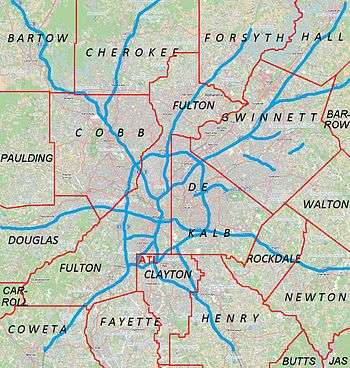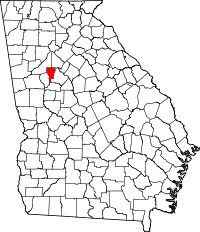Mountain View, Georgia
| Mountain View | |
|---|---|
| Unincorporated community | |
 Mountain View Location within the state of Georgia | |
| Coordinates: 33°38′30″N 84°23′25″W / 33.64167°N 84.39028°WCoordinates: 33°38′30″N 84°23′25″W / 33.64167°N 84.39028°W | |
| Country | United States |
| State | Georgia |
| County | Clayton |
| Time zone | Eastern (EST) (UTC-5) |
| • Summer (DST) | EDT (UTC-4) |
Mountain View is an Unincorporated community in northwest Clayton County, Georgia, United States. It is bounded on the east and south by Forest Park, on the north by the Fulton County line, and on the west by Hartsfield-Jackson Atlanta International Airport.

History
Mountain View was originally called Rough & Ready. The name came from the Rough and Ready Tavern, which was a stagecoach stop on the line from Macon to Upper Georgia.[1] The town was later the site of the first railroad station south of Atlanta on the Macon and Western Railroad, 13 miles from the terminus at East Point, Georgia. In August 1864, prior to the Battle of Jonesborough, the Rough and Ready Tavern served briefly as headquarters for Confederate General William J Hardee.[2]
Its name was changed when it was incorporated as a city in 1956. The name "Mountain View" refers to the fact that, on a clear day, one can see Stone Mountain 20 miles to the east. The slogan, "Gateway to Clayton County," was featured on the city seal.
Mountain View was a city from 1956 to January 1978, when the Georgia General Assembly voted to repeal the city charter. A five-member delegation of Clayton County legislators proposed a bill to abolish the city in order to clean up corruption in the city government. During his four terms in office (1972-1977) Mayor Ray King, though popular with his constituents, was charged with bribery, nepotism, conspiracy, assault, and violating the city charter by accepting an illegal salary. Rather than reform the city leadership, Clayton County sought to dissolve Mountain View entirely. State Representative Rudolph Johnson of Morrow, chair of the delegation said, “They’ve had controversy out there for 20 years. It’s an accumulation of things, really.”[3]
In 1972, (then) Governor Jimmy Carter suspended Mountain View's police powers for several months during an investigation into an alleged speed trap on I-75. Though no wrongdoing was confirmed, the allegations contributed to Mountain View's bad publicity. Along with the city's controversial 24-hour sales of beer and wine in an otherwise dry county, its reputation for public drunkenness and fighting, and a notorious mayor, and the legislative delegation determined the city to be a “blight on Clayton County."
However, long before Mountain View was formally dissolved, the City of Atlanta Department of Aviation actively acquired properties and assisted in relocation of the residential population due to noise impacts from the nearby runways. In 1978, sound expert Dr. Clifford Bragdon called Mountain View the “most noise-impacted city in the U.S. or Europe.”[4] Despite the constant roar of jet engines, many residents did not want to leave and some homes were taken by eminent domain. Past population estimates were between 2,100 and 3,000 persons. The current population is unknown, but many of Mountain View's original businesses remain.
Mountain View's African American community was located west of the railroad tracks in the northwest corner of the city. This area was called Plunkett Town or Plunky Town. It was directly across Interstate I-75 from Ford's Atlanta assembly plant.
Plans are on the drawing board for redeveloping the area, but these plans call for no residential population due to the noise from the takeoffs and landings at one of the world's busiest airports.
Mountain View in fiction
Gone with the Wind, a 1936 novel by Margaret Mitchell, mentions (in Chapter XX) fighting during the Battle of Jonesborough at Rough and Ready.
Noted resident
- D.P. Spiker: alternate delegate from Georgia to the 1952 Republican National Convention.
Gallery
Abandoned areas of Mountain View
References
- ↑ Rough & Ready historical marker
- ↑ Rough & Ready Tavern historical marker
- ↑ "Town closer to extinction". Rome News-Tribune. 12 January 1978. Retrieved 11 May 2012.
- ↑ McNulty, Timothy (January 29, 1978). "A town Georgia could not shut down". Chicago Tribune.
External links
- Redevelopment projects in Clayton county
- Rough and Ready historical marker
- Rough and Ready Tavern historical marker
